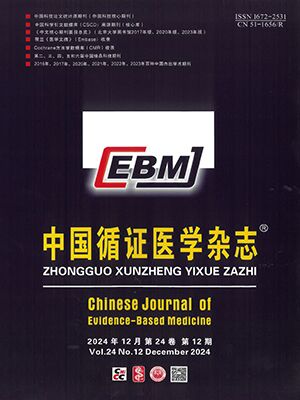| 1. |
钟婕, 周英凤. 实施性研究的方法学及应用进展. 中华护理杂志, 2018, 53(7): 862-866.
|
| 2. |
Streiner DL. The 2 "Es" of research: efficacy and effectiveness trials. Can J Psychiatry, 2002, 47(6): 552-556.
|
| 3. |
Eccles MP, Mittman BS. Welcome to implementation science. Implement Sci, 2006, 1(1): 1-3.
|
| 4. |
全球慢性病联盟中-加抑郁研究团队. 推进实施性研究在中国公共卫生领域的应用. 中华预防医学杂志, 2020, 54(1): 8-12.
|
| 5. |
刘雅莉, 谢琪, 刘保延, 等. 临床试验百年历程概述. 中国循证医学杂志, 2016, 16(11): 1241-1249.
|
| 6. |
Bauer MS, Kirchner J. Implementation science: What is it and why should I care. Psychiatry Res, 2020, 283: 112376.
|
| 7. |
Morris ZS, Wooding S, Grant J. The answer is 17 years, what is the question: understanding time lags in translational research. J R Soc Med, 2011, 104(12): 510-520.
|
| 8. |
Bernet AC, Willens DE, Bauer MS. Effectiveness-implementation hybrid designs: implications for quality improvement science. Implement Sci, 2013, 8(1): 2-3.
|
| 9. |
Curran GM, Bauer M, Mittman B, et al. Effectiveness-implementation hybrid designs: combining elements of clinical effectiveness and implementation research to enhance public health impact. Med Care, 2012, 50(3): 217-226.
|
| 10. |
Landes SJ, McBain SA, Curran GM. An introduction to effectiveness-implementation hybrid designs. Psychiatry Res, 2019, 280: 112513.
|
| 11. |
Brown CH, Curran G, Palinkas LA, et al. An overview of research and evaluation designs for dissemination and implementation. Annu Rev Public Health, 2017, 38: 1-22.
|
| 12. |
David HP, Nhan TT, Taghreed A. Implementation research in health: a practical guide. Alliance for Health Policy and Systems Research, World Health Organization, 2013: 46-47.
|
| 13. |
Green BB, Coronado GD, Schwartz M, et al. Using a continuum of hybrid effectiveness-implementation studies to put research-tested colorectal screening interventions into practice. Implement Sci, 2019, 14(1): 53.
|
| 14. |
Milaneschi Y, Simmons WK, van Rossum EFC, et al. Depression and obesity: evidence of shared biological mechanisms. Mol Psychiatry, 2019, 24(1): 18-33.
|
| 15. |
Fang S, Wang M, Zheng Y, et al. Acupuncture and lifestyle modification treatment for obesity: a meta-analysis. Am J Chin Med, 2017, 45(2): 239-254.
|
| 16. |
Kamenov K, Twomey C, Cabello M, et al. The efficacy of psychotherapy, pharmacotherapy and their combination on functioning and quality of life in depression: a meta-analysis. Psychol Med, 2017, 47(3): 414-425.
|
| 17. |
Ma J, Yank V, Lv N, et al. Research aimed at improving both mood and weight (RAINBOW) in primary care: A type 1 hybrid design randomized controlled trial. Contemp Clin Trials, 2015, 43: 260-278.
|
| 18. |
Glasgow RE, Vogt TM, Boles SM. Evaluating the public health impact of health promotion interventions: the RE-AIM framework. Am J Public Health, 1999, 89(9): 1322-1327.
|
| 19. |
Dehar MA, Casswell S, Duignan P. Formative and process evaluation of health promotion and disease prevention programs. Eval Rev, 1993, 17(2): 204-220.
|
| 20. |
Palinkas LA, Mendon SJ, Hamilton AB. Innovations in mixed methods evaluations. Annu Rev Public Health, 2019, 40: 423-442.
|
| 21. |
翁瑛丽, 赵博伦, 周璇, 等. 实施性研究中保真度测评的研究进展. 护理学报, 2020, 27(19): 23-28.
|
| 22. |
Powell BJ, Waltz TJ, Chinman MJ, et al. A refined compilation of implementation strategies: results from the expert recommendations for implementing change (ERIC) project. Implement Sci, 2015, 10: 21.
|
| 23. |
Pinnock H, Barwick M, Carpenter CR, et al. Standards for reporting implementation studies (StaRI): explanation and elaboration document. BMJ Open, 2017, 7(4): e013318.
|
| 24. |
Leung LB, Rubenstein LV, Yoon J, et al. Veterans health administration investments in primary care and mental health integration improved care access. Health Aff (Millwood), 2019, 38(8): 1281-1288.
|
| 25. |
Owen RR, Woodward EN, Drummond KL, et al. Using implementation facilitation to implement primary care mental health integration via clinical video telehealth in rural clinics: protocol for a hybrid type 2 cluster randomized stepped-wedge design. Implement Sci, 2019, 14(1): 33.
|
| 26. |
Kirchner JE, Smith JL, Powell BJ, et al. Getting a clinical innovation into practice: an introduction to implementation strategies. Psychiatry Res, 2020, 283: 112467.
|
| 27. |
Kitson AL, Harvey G. Methods to succeed in effective knowledge translation in clinical practice. J Nurs Scholarsh, 2016, 48(3): 294-302.
|
| 28. |
张立华, 顾莺. 临床实践变革的概念框架: 从PARIHS到i-PARIHS. 中国循证医学杂志, 2019, 19(6): 741-747.
|
| 29. |
Kadota JL, Musinguzi A, Nabunje J, et al. Protocol for the 3HP Options Trial: a hybrid type 3 implementation-effectiveness randomized trial of delivery strategies for short-course tuberculosis preventive therapy among people living with HIV in Uganda. Implement Sci, 2020, 15(1): 65.
|
| 30. |
Michie S, van Stralen MM, West R. The behaviour change wheel: a new method for characterizing and designing behaviour change interventions. Implement Sci, 2011, 6: 42.
|
| 31. |
陈文嘉, 徐东, 李慧, 等. 实施科学理论的分类与介绍. 中国循证医学杂志, 2020, 20(8): 986-992.
|
| 32. |
Thorpe KE, Zwarenstein M, Oxman AD, et al. A pragmatic-explanatory continuum indicator summary (PRECIS): a tool to help trial designers. J Clin Epidemiol, 2009, 62(5): 464-475.
|
| 33. |
Loudon K, Treweek S, Sullivan F, et al. The PRECIS-2 tool: designing trials that are fit for purpose. BMJ, 2015, 350: h2147.
|
| 34. |
谢润生, 徐东, 李慧, 等. 医疗卫生领域中实施科学的研究方法. 中国循证医学杂志, 2020, 20(9): 1104-1110.
|
| 35. |
Rudd BN, Davis M, Beidas RS. Integrating implementation science in clinical research to maximize public health impact: a call for the reporting and alignment of implementation strategy use with implementation outcomes in clinical research. Implement Sci, 2020, 15(1): 103.
|
| 36. |
Pfadenhauer LM, Gerhardus A, Mozygemba K, et al. Making sense of complexity in context and implementation: the context and implementation of complex interventions (CICI) framework. Implement Sci, 2017, 12(1): 21.
|
| 37. |
Kemp CG, Wagenaar BH, Haroz EE. Expanding hybrid studies for implementation research: intervention, implementation strategy, and context. Front Public Health, 2019, 7: 325.
|




